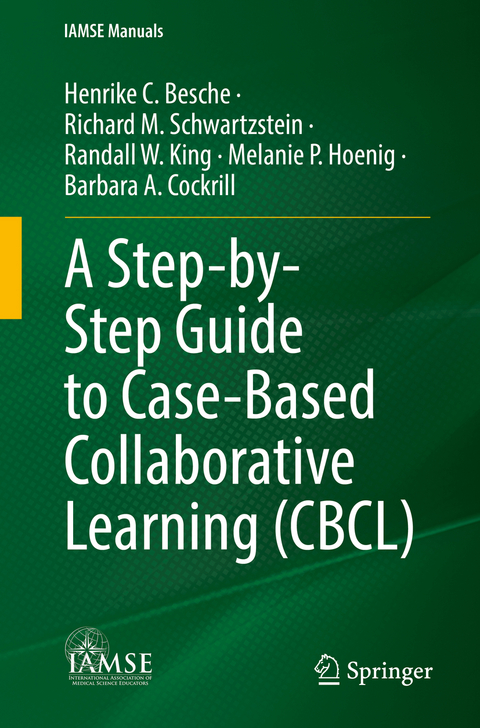
A Step-by-Step Guide to Case-Based Collaborative Learning (CBCL)
Springer International Publishing (Verlag)
978-3-031-14439-4 (ISBN)
This book is about Case-Based Collaborative Learning (CBCL) for medical educators. CBCL combines elements from team-, case- and problem-based based learning using a flipped classroom model. This book presents a detailed "how to" guide on how to create CBCL classroom materials, how to facilitate vivid discussions, and how to support students and faculty in a CBCL curriculum. The first chapter explores the CBCL method in context of established educational principles. The second chapter provides a step-wise guide to creating CBCL teaching materials from scratch or adapting existing resources. Chapter three discusses how to support both - faculty and students - in making the most out of in-class case discussions. The last chapter explores modifications to the CBCL method that have evolved over time in adapting to teaching remotely, as well as promoting self-directed learning skills in students. While originally developed in context of undergraduate medical education, the CBCL method is of interest to anyone in higher education that values flipped classroom methods and discussion-based teaching.
Dr. Henrike C. Besche is a Lecturer in Cell Biology and the Associate Director for Curriculum Integration in the Program of Medical Education at Harvard Medical School. In her role she is responsible for various aspects of basic science teaching in the pre- and post-clerkship HMS Pathways curriculum ranging from curriculum and faculty development to active teaching. Dr. Besche is an expert in case-based collaborative learning and works closely with other faculty on case writing and facilitation. Dr. Richard M. Schwartzstein is the Ellen and Melvin Gordon Distinguished Professor of Medicine and Medical Education at Harvard Medical School and Executive Director of the Shapiro Institute for Education and Research at Harvard Medical School and Beth Israel Deaconess Medical Center. Dr. Schwartzstein first piloted the CBCL format in his course "Integrated Human Physiology, "and chaired the steering committee that developed the Pathways curriculum at Harvard Medical School. He is also the chief of the Division of Pulmonary, Critical Care and Sleep Medicine at Beth Israel Deaconess Medical Center. Dr. Randall W. King is the Harry C. McKenzie Professor of Cell Biology at Harvard Medical School. He co-chaired the subcommittee on Curricular Content and Organization as part of the Pathways curriculum redesign. He directs the Foundations Course, which introduces first-year students to ten basic science disciplines in an integrated format using the CBCL approach. In addition, he directs an Advanced Integrated Science Course on Cancer Biology, taken by students in the post-clerkship phase of the curriculum. Dr. Melanie P. Hoenig is an Associate Professor of Medicine and co-chaired the steering committee that developed the Pathways curriculum at Harvard Medical School and is now the course director for the pre-clinical course, Homeostasis II which combines endocrine, renal and gastrointestinal physiology and pathophysiology taught in the CBCL format. Dr. Hoenig practices nephrology at Beth Israel Deaconess Medical Center, a Harvard-affiliated teaching hospital. Dr. Barbara A. Cockrill is the George E. Thibault Academy Associate Professor of Medicine and Associate Dean for Faculty Development in Medical Education for the MD Program at Harvard Medical School. In addition to providing training and support for HMS teaching faculty in all phases of the curriculum, she is also a course director for a pre-clinical pathophysiology course taught in the CBCL format. Dr. Cockrill is practices pulmonary and critical medicine at the Brigham and Women's Hospital, a Harvard-affiliated teaching hospital.
Preface.- Chapter 1. What is Case-based collaborative learning (CBCL)?.- Chapter 2. Step-by-step guide to creating CBCL modules.- Chapter 3. Facilitating CBCL discussions.- Chapter 4. Variations on CBCL.
| Erscheinungsdatum | 27.09.2022 |
|---|---|
| Reihe/Serie | IAMSE Manuals |
| Zusatzinfo | XI, 54 p. |
| Verlagsort | Cham |
| Sprache | englisch |
| Maße | 155 x 235 mm |
| Gewicht | 118 g |
| Themenwelt | Sozialwissenschaften ► Pädagogik ► Berufspädagogik |
| Sozialwissenschaften ► Pädagogik ► Erwachsenenbildung | |
| Schlagworte | Case based learning • cbcl • Collaborative Learning • engaged learning • medical education • PBL • project based learning • Team based learning |
| ISBN-10 | 3-031-14439-2 / 3031144392 |
| ISBN-13 | 978-3-031-14439-4 / 9783031144394 |
| Zustand | Neuware |
| Informationen gemäß Produktsicherheitsverordnung (GPSR) | |
| Haben Sie eine Frage zum Produkt? |
aus dem Bereich


